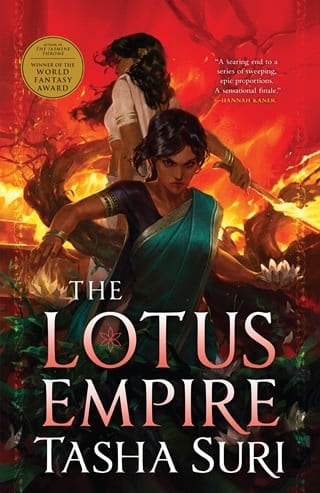Chapter 81 Bhumika
BHUMIKA
She lay gasping on the ground. The waters were overtaking her. She could not breathe through them. Her ghosts were drawing in. Jeevan was holding her steady, his hand over her own. Khalida was leaning over her, calling her name. Crying.
She saw her ghosts, and suddenly she knew them.
They were all her temple siblings. All children like her, who had served on the Hirana and passed through the waters—and drowned, or burned. She knew their names, their dreams. She mourned them.
They were knowledge from the deathless waters. They were the scraps of themselves—face, voice, memory—that the waters had saved long after they died. They were corpses given brief life.
She knew now. The waters left in her were returning to the sangam—and all that she had left in the sangam, her own voice and memory and spirit—were flowing into her in turn.
She turned horrified eyes on the ghost kneeling closest to her. His bowl was empty. His veil was gone. He was smiling.
“Ashok,” she said, voice splintering.
“I told you that you’d mourn,” he said.
He vanished. She reached a hand for him, trying to grab him. Trying to hold him.
She followed him into the sangam. Left her flesh behind.
She fell.
He’d been right. She grieved. He was gone.
She kneeled in star-flecked water. The three rivers of the sangam churned, storm-driven, breaking their banks. She could see the shadow of Ganam, a distant light. But there before her was Priya.
She knew her sister now. Knew all the terror and love that Priya induced in her, just by being her brave, bright, awful self. It rushed through her.
Priya wasn’t just shadow. She stood in the rising, rough waves untouched by them. Her body was immovable. Her body was at war with itself. Flowers and flesh—brown eyes and marigold irises. She was a yaksa and she was not. She was more than any yaksa Bhumika had seen before, and she was also Priya, always Priya.
“Priya,” she called out, the sangam rippling, twisting. “Priya, please, can you hear me? You idiot, you fool, what have you done?” She crawled through the water and held a hand out.
Priya’s eyes met her own. Gold flowers. Brown eyes.
“Bhumika?” she whispered. “You remember? You remember me?”
Bhumika could have wept.
“Even when I didn’t know you, I never forgot you,” she said, her voice trembling. “Come on, Priya. Wherever you are—come home.”
Slowly, shakily—as if she didn’t know how her flesh worked—Priya reached out a hand.
For a moment they touched across the sangam. Two sisters. And Bhumika remembered herself, utterly remembered herself. She saw Priya through the waters and remembered Priya as an angry child; Priya as a sullen adult; Priya smiling at her when she left to fight the empress’s war, that last time Bhumika had seen her and known her.
The water grew wilder and wilder. The sangam was churning into an endless sea, and Priya was at the heart of it. Priya was bound to a yaksa, and Priya was being swallowed whole.
“I have to destroy the waters,” Priya said. “Bhumika. I have to make them nothing. Or Mani Ara—or I, or we—will never be gone. The world will be twisted by magic that shouldn’t be here. I’m so sorry. I have to fight her. I have to win.” Flowers turned to starlight on her face. Turned, inexorably again, to flesh.
“Priya,” she called. “Priya, don’t. Priya, Priya—”
Her sister smiled. Her sister mouthed a word.
Goodbye.
Back into her body. She coughed and coughed, lungs aching. Found her voice. “I’m fine,” she said. “Don’t worry. I remember. Jeevan, I remember.” She was herself. And she did grieve then, as her memories rushed over her, as she realized what price she had paid. Her family.
She reached out her arms. “Padma,” she said. “Please.”
Rukh came to her. Padma in his arms. Her daughter tucked herself tighter against Rukh, and Bhumika wept, joyous and grieving, because her daughter was alive, and because her daughter did not know her.
But knowing didn’t matter. The love and relief Bhumika felt were enough.
The ground of the Hirana was trembling, the triveni’s stone cracking.
“The Hirana is going to fall,” Bhumika said. She could feel the magic fading in the stone around her. Somehow, Priya’s battle in the sangam was weakening it. “We need to go.”
“If we go down, we’re going to die by fire,” said the boy Ashish tightly. “It swallowed the yaksa, but it hasn’t stopped burning. I know. I watched.”
“I don’t want to die,” a little girl wailed.
“Hush, Pallavi,” Rukh said. He drew her against his side. “You’re not going to. We’re going to be okay. The fire’s just taking time to die away, that’s all.”
The ground shook again, more violently.
“We need to climb,” Ganam said firmly. “All of us. Can you do it?”
“We can climb,” the boy Ashish said. His expression was grim. “Priya told us to learn. She started teaching us—and we kept on going.”
Bhumika looked between the children and adults gathered together. She remembered, distantly, her own childhood—the temple siblings who’d died, falling to their deaths, on their first climb down the Hirana. How Bhumika had cried herself sick after her first climb, muffling her tears with a pillow so Sanjana would not judge her. How Priya had laughed all through her own climb, jumping down on light feet, delighted with her own strength and with the Hirana’s love for her.
“Come,” she said, and watched a dozen eyes fix on her trustingly. “We need to move swiftly.” She looked at Ganam’s arm, bound close to his chest. “Can you do this one-handed?” she asked.
“I’m going to have to.”
It was a terrifying journey down. The children were moving slowly, carefully, with the eyes of the adults on them. Bhumika had quietly ordered a number of the strongest people who’d been trapped on the Hirana to move down directly beneath the children. If one lost their footing and fell, those people had a chance of catching them—and not toppling down to their own deaths in the process.
Climbing was hard. Perhaps it was because she had only just returned to her body. But she didn’t think so. Something had changed in the sangam, and her magic shuddered and broke along with it. Even maintaining her own footing—a task she had never struggled with on the Hirana—was difficult. She was glad that Jeevan carried Padma, safely wrapped against his chest.
The sound of a storm roared in her ears. But the air around her only smelled of smoke, and sang with fire.
“Ganam,” she called out, letting the smoke-filled air carry her voice to him. She craned her neck. He was below the children, but she saw him look up. “Can you feel it?”
He winced, a ripple of pain crossing his face. “I can,” he said grimly.
Rukh, near him, yelled, “The stone’s cracking!”
There was an ominous groan of stone, so deep it was like the bellowing of a beast. Fire-flecked wind brushed Bhumika’s cheek.
“Keep moving steadily,” she said, not letting her panic show in her voice. Panic would make them careless. Panic would make them fall.
There was another roar—this time of water in her skull. She swayed, and so did Ganam.
“Bhumika,” Jeevan called.
“I’m fine. Someone hold Ganam steady,” she ordered. Khalida clutched him obediently, pinning him to the wall. “Don’t let him fall.” She hooked her own feet into crevices, and looped her arm around a carving. They had precious little time; they needed to keep moving. But if she moved now, she wouldn’t make it. She was dizzy.
She felt a firm hand on her arm.
“I’m not letting you fall,” Jeevan gritted out. His arm trembled where he held her. “I would never let you fall.”
Hold me , she begged the Hirana, shaping the words silently on her lips. She was thrice-born. The Hirana knew her. It had always welcomed her, always shaped itself to her body. But now the stone fractured and shook, dust under her fingers.
Jeevan knew her better.
“I will,” said Jeevan, as Bhumika’s daughter cried. “I will.”
“We need to keep going,” she said, her body shivering as if she’d risen from cold water. There was no time left to worry about inducing panic; panic was now reasonable. She blinked awful tears from her eyes, locked the searing arrow to her heart away, away.
They made it to the ground. Bhumika braced herself for fire. Her feet met soil—
And the fire faded.
Whatever the flames had come for, they had it now. Ahiranya was burned and splintered, the forest shorn to ash, but the Ahiranyi—at least some of them, at least this crowd of people who surrounded her, shaking and weeping with relief—had survived.
 Fullepub
Fullepub 



